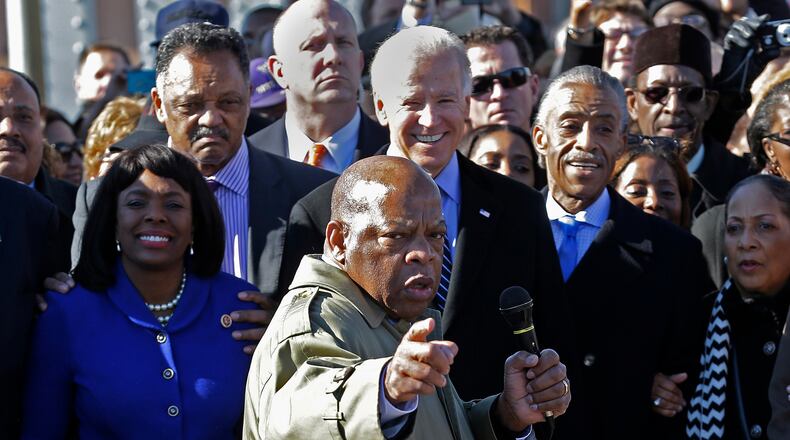In virtual remarks on the anniversary of the “Bloody Sunday” march in Selma, Alabama, where John Lewis, Hosea Williams and other activists were violently attacked, President Joe Biden announced plans for an executive order related to expanding voting access.
At the same event Sunday, Georgia’s U.S. Sens. Jon Ossoff and Raphael Warnock received awards honoring historic wins that flipped the balance of power in Washington. Ossoff is the first Jewish senator from Georgia, and Warnock is the state’s first Black senator.
Acknowledging the limited scope of the executive order, the president also endorsed two election access bills supported by Democrats but facing an uncertain future in the U.S. Senate, where Republicans can use the filibuster to block action.
The U.S. House approved one measure — a sweeping election, campaign finance and redistricting bill ― last week. The second proposal, the Voting Rights Advancement Act to reinstate judicial reviews of new election laws in Georgia and other states, has not yet come up for a vote during the current congressional session but is expected to be named after U.S. Rep. John Lewis, who died last year.
Biden, in virtual remarks commemorating the anniversary of Bloody Sunday, noted that activists like Lewis, C.T. Vivian and Joseph Lowery all died since last year’s events. He said many of the voting access battles those civil rights icons from Atlanta fought are still relevant today.
“The legacy of the march in Selma is that while nothing can stop a free people from exercising their most sacred power as citizens — there are those who will do everything they can to take that power away,” Biden said.
People attending the Martin and Coretta King Unity Breakfast in person received their meals drive-through style and honked their owns instead of applause. Ossoff addressed the crowd from a live video feed, noting that Saturday’s vote on a new round of stimulus, which passed without a single Republican vote, demonstrates the lasting effects of the voting rights movement.
“Georgia voters made that possible — Black voters in Georgia made that possible,” he said. “And without the sacrifices of those who crossed the Edmund Pettus Bridge 56 years ago, it would not have been possible.”
Activists, including Lewis, were beaten by law enforcement on March 7, 1965, when they crossed the bridge as part of a march to Montgomery, Alabama. The incident, which received national media coverage, was considered pivotal to the civil rights movement.
Warnock, in pre-recorded remarks, said he will continue to push for legislation that will prevent states like Georgia from restricting voting access.
“In memory of John Lewis, in memory of so many others who stood up: we have to stand up in this moment because our vote is our voice,” he said. “Our voice is our human right.”
Biden’s keynote speech referenced former President Donald Trump’s attempts to overturn election results in swing states like Georgia, as well as the Jan. 6 riot at the U.S. Capitol. He noted that more than 250 elections-related bills have been filed in 43 states since then.
These were efforts to undo the will of voters, Biden said, and should be met with new laws that prevent that from happening in the future.
“We cannot let them succeed,” he said.
In addition to backing congressional action, Biden said his executive order will make it easier to register voters on federal property, increase transparency for Americans in the military and overseas who want to vote by mail and improve access to voting for Native Americans and people with disabilities.
He ended his speech by recalling a conversation he and his wife, Jill, had with Lewis a few days before he died on July 17. At the time, Biden was the Democratic nominee for president and had planned to console the ailing longtime congressman.
“He asked me to stay focused on the work left undone to heal and to unite this nation around what it means to be an American, that’s the God’s truth,” Biden said. “John wouldn’t talk about his pending death or his concerns. He said we’ve just got to get this done. That we’re all created equal; we all deserve to be treated equally.”
About the Author
Keep Reading
The Latest
Featured





